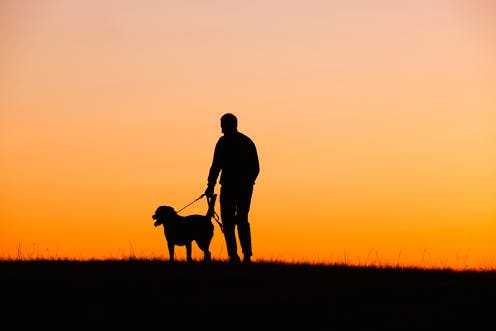What makes dogs so different from other pets and why losing a dog can be harder than losing a relative or friend? Why can the pain of their death be as hard as the death of loved ones? Science has the answer.
Dogs are an important part of their owner’s daily lives and losing them can be as painful as losing a relative, according to a new scientific report.
When people who have never had a dog see how a loved one cries when losing their beloved pet, they are likely to think that it is an overreaction.

“However, those who love their dog know the truth: their pet is not ‘just a dog,'” says Frank McAndrew, a professor of psychology at Knox College in the United States.
His research has confirmed that for most people, the loss of a dog is, in almost every way, comparable to the loss of a loved one.
“Maybe if people realized how strong and intense the link between people and their dogs is, the pain [that causes their death] would be more widely accepted,” says the scientist, adding that this would greatly help measure to the owners of the dogs to accept the death and move on.
What is special about dogs?
To begin with, dogs have had to adapt to living with humans for the past 10,000 years. And they have done very well: they are the only animals that have evolved specifically to be our companions and friends.
The anthropologist Brian Hare has suggested the “hypothesis of domestication” to explain how the dogs have evolved from their famous ancestor, the gray wolf, to become so ‘sociable’ animals that now that we interact with them from the same way that we relate to people.
Perhaps one of the reasons why our relationships with dogs can become closer and more satisfying than with humans is that these animals provide us with unconditional positive feedback, without criticism.
And this is not casual. Dogs have been selectively bred for generations to pay attention to humans. Using magnetic resonance imaging, scientists have shown that the brains of dogs respond to the praise of their owners as vigorously as they do to food Dogs recognize people and can learn to interpret the emotional states of humans according to their facial expression.

Hence, it is not surprising that human beings respond to such affection, to that disinterested help, to that loyalty. Just observing dogs can make people smile and the welfare of the owners of these animals is on average better than that of people who own cats or no pets.
Also, according to the study, the loss of a dog can also seriously disturb the daily routine of its owner, even more deeply than the loss of most of his friends and relatives. For owners, their daily schedules -even their vacation plans- depend on the needs of their pets.
As a member of the family
The psychologist Julie Axelrod has pointed out that the loss of a dog is very painful because the owners are not only losing the pet. This could also mean the loss of a source of unconditional love, a companion that provides security and comfort.
According to a recent survey, many dog owners in mourning will even misinterpret visions and ambiguous sounds like the movements, pants and moans of the dead pet. This is more likely to happen soon after the pet’s death, especially among owners who had high levels of attachment to their pets.
